Cheetah Conservation Fund Celebrates International Cheetah Day at COP28 in the UAE
-

- by CCF Staff December 3, 2023
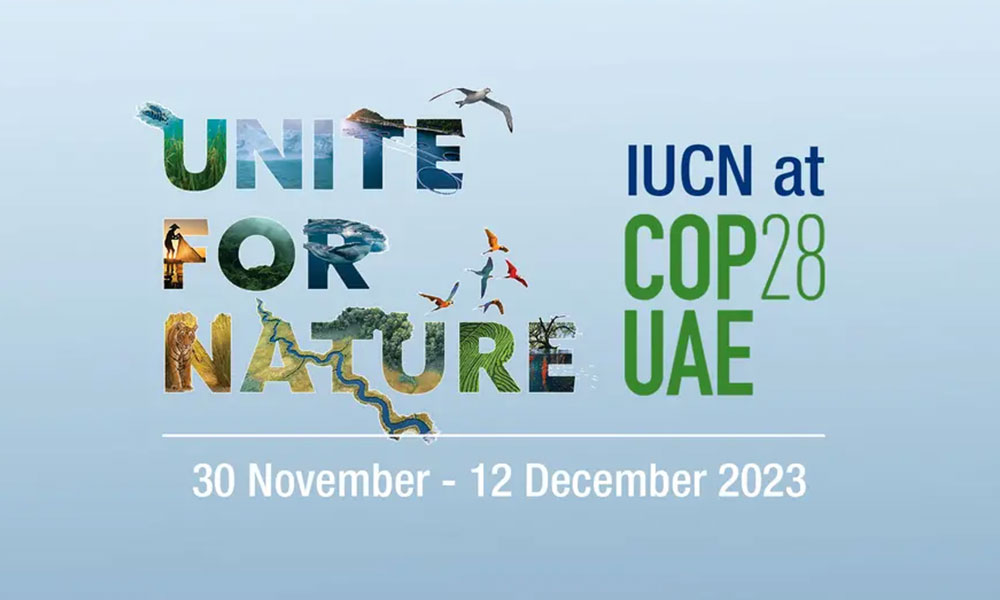
FOR IMMEDIATE RELEASE
OTJIWARONGO, Namibia, DUBAI, UAE, Alexandria, VA, USA, London, UK, [28 November 2023] – In recognition of International Cheetah Day on December 4th, Cheetah Conservation Fund (CCF) collaborates with fellow conservationists from around the world to highlight the plight of the world’s fastest land animal, the cheetah. This day, coinciding with CCF’s participation in IUCN’s pavilion at the upcoming Climate COP28 in Dubai, is not just a celebration of these unique cats but also an urgent reminder of the challenges threatening their survival in the wild, including the impact of climate change.
International Cheetah Day Reception at Climate COP28
The Cheetah Conservation Fund (CCF) will be hosting an International Cheetah Day reception, entitled Saving the Cheetah: A Climate Change Solution at the IUCN Unite for Nature Pavilion at the Climate COP28 in Dubai on the 3rd of December from 19:00 to 21:00.
The reception will feature the Cheetah as an Icon for the Arid Landscapes being affected most with climate change, and present climate change solutions needed to ensure the cheetah’s survival for future generations.
Cheetahs are amongst the most important apex predators in African and Asian landscapes that are already facing the impact of climate change. Apex predators are key to the resilience of ecosystems. The conservation of apex predators in an environment creates a cascading effect down to primary producers. In an age where climate change is destabilizing landscapes more than ever we cannot afford to lose a single species, let alone the cheetah – an iconic species for the arid landscapes.
Apex predators are also key to the economic future of developing countries. In a financial landscape increasingly interested in Nature Markets, predators offer a healthy ecosystem and therefore a productive Natural Assets ‘bank account’ for a country. The host of the International Cheetah Day event, CCF’s Founder and Executive Director, Professor Laurie Marker shares that “in the past century, cheetah have been reduced to only 9% of their original range. Today, there are less than 7,500 adult and adolescent cheetahs living in 31 populations in 23 countries of Africa and the last of the Asiatic cheetahs found in Iran with less than 25. Of these remaining populations, over two thirds are less than 100 individuals. Our research has highlighted that if nothing is done cheetah might go extinct within the next 20 years, as the majority of the cheetahs are living outside of protected areas.
We estimate possibly five years before the point of no-return to maintain a viable wild cheetah population in many areas of its range. Although humans are the principal cause for the ecosystem’s imbalance, humans are also the solution.”

An acoustic rendition of Running with the Cheetah, a song written and presented by Davey Harris, will be released for International Cheetah Day. Song writer, Davey Harris explains “This song was created to honor the spirit and energy of the cheetah. Many people don’t realize that this animal will go extinct if we don’t do something about it. This was my way to help raise awareness while also channeling the fun, beautiful, and playful vibes of one of the coolest animals in the world! Davey Harris will be at the reception (see bio after the text of this release).
Balancing Development and Wildlife Conservation
In observing International Cheetah Day, we underscore the need for a balanced approach to cheetah conservation, considering both human development and wildlife conservation.
“The CCF’s research emphasizes the pivotal role of the cheetah in African ecosystems and the importance of environmental education in altering perceptions about predators. As Dr Laurie Marker points out, “coexisting with human communities in rural Africa and building community alliances is vital. We are deeply involved in enhancing livelihoods and promoting predator-friendly farming practices.”
Honorable Professor Peter Katjavivi, the Namibian Speaker of the House, and CCF’s International Patron states. “As the International Patron of the Cheetah Conservation Fund and as a Namibian, I’m proud to celebrate International Cheetah Day. The cheetah is the icon of Africa’s arid landscapes, and cheetah survival is linked to the health of these ecosystems, which are threatened by climate change. The cheetah plays an important role in these arid ecosystems where it lives throughout its range, mostly outside of protected areas. In Namibia, it is our vision to strive for an environment where human and wildlife, including cheetahs, can co-exist in harmony. Namibia is known as the Cheetah Capital of the World and has developed programs to ensure our arid systems are healthy for the future of the Cheetah and the people. CCF works with communities to show how to live together with their livestock, and wildlife. Cheetah survival is tied into the economies of these areas and acts as a thermometer for a healthy ecosystem. December 4th, International Cheetah Day, is a special Global Day to bring awareness of this magnificent cat, the fastest of all the land animals. Less than 7,500 cheetahs survive in the wild today, of which about 1500 are found in Namibia. We must do all we can to assure the continued survival of these cats and their environment.”
Mr. Kumara Wakjira, the Director General of Ethiopia Wildlife Conservation Authority (EWCA) expresses on International Cheetah Day that “Ethiopia, as a range country for cheetahs, has extensive savannah grasslands and suitable habitat for their widespread distribution. Cheetahs keep the ecosystem balanced by hunting their wild prey and have economic significance through ecotourism. However, today cheetahs face serious challenges, across Ethiopia and throughout their remaining ranges. The principal threats include habitat loss, decline in prey base, illegal trade, conflicts with the local community, and impacts of climate change. Hence, Ethiopia works closely with the CCF to address these challenges, mainly emphasizing on awareness raising and facilitating cross border cooperation against illicit cheetah smuggling and trade. Together, we need to cooperate to save the iconic cheetah from extinction!”
As stated by Biodiversity Director of Agile Consulting in Kenya, Fiesta Warinwa, “given the current Climate Change situations, community conservancies play a key role in maintaining healthy wildlife populations and ensure there is increase in numbers and diversity of species. Therefore, communities can be good ambassadors not only for cheetahs but for cheetah habitats. Cheetah habitats also provide livelihood development opportunities.”
In addition to livelihoods, CCF is committed to improving the lives of people living in the rural, last-mile communities in which the cheetah also lives. In particular, CCF recognizes the plight of women and girls in these areas, often bearing the brunt of climate change while also facing a multitude of development challenges such as access to education and health services. According to Carina Hirsch, Head of Advocacy & Policy at the Margaret Pyke Trust, “in many cheetah range states, a significant proportion of women have an “unmet need” for modern reproductive health services. Improved access to reproductive health services and information helps empower women and girls to stay in education and take part in community decision making, helping build individuals’ and communities’ resilience and ability to adapt to climate change. If we are to address climate change in areas of interest to CCF – these last mile communities – we must work with health and development partners to implement transformative, cross-sectoral and gender-sensitive approaches that integrate women’s health and community development.”
Saving the cheetah not only protects a beautiful and special species, it also directly combats climate change. Vance Martin, Founder, and past President of the International Wildness Foundation (WILD) and Trustee of the CCF, states “Healthy predators create healthy ecosystems that sequester significant carbon… a win for people, climate, and animals. Cheetahs ‘animate the carbon cycle’. Healthy predator populations create healthy ecosystems that draw down and sequester an abundance of carbon, more than originally thought. Protecting the cheetah is a direct response to combatting climate change… a nature-based solution that is a solution that benefits all life.”
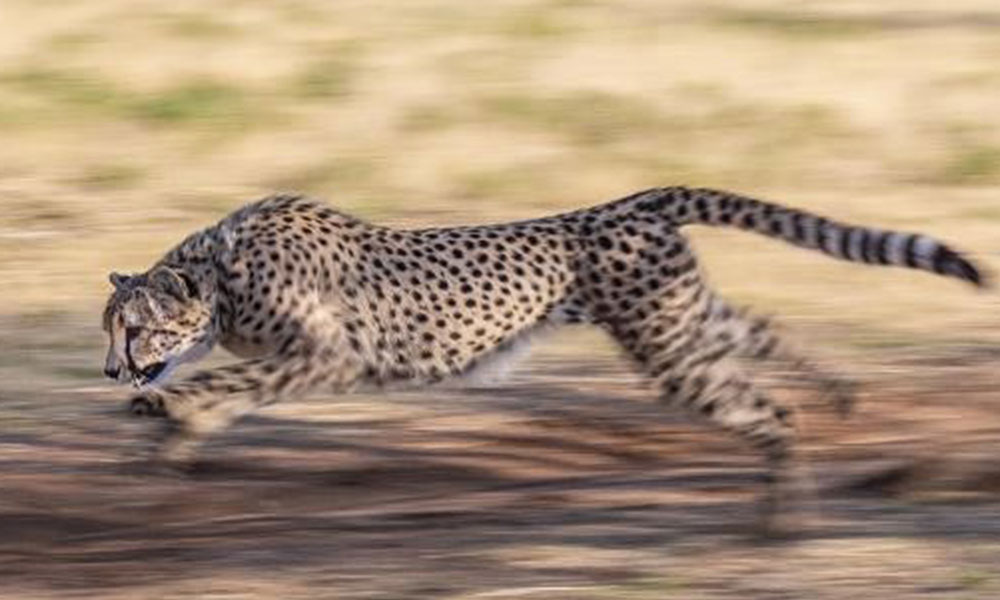
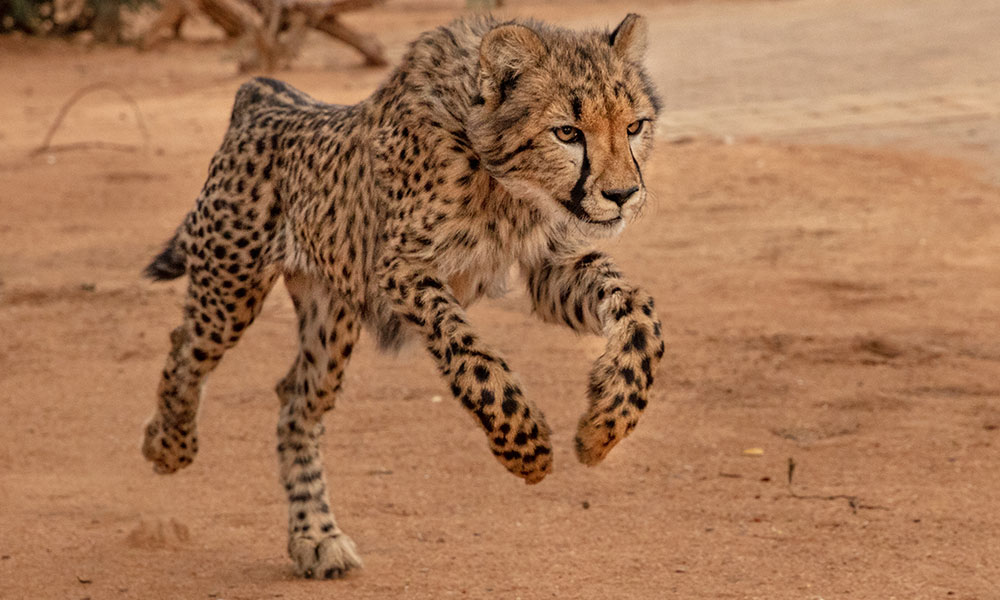
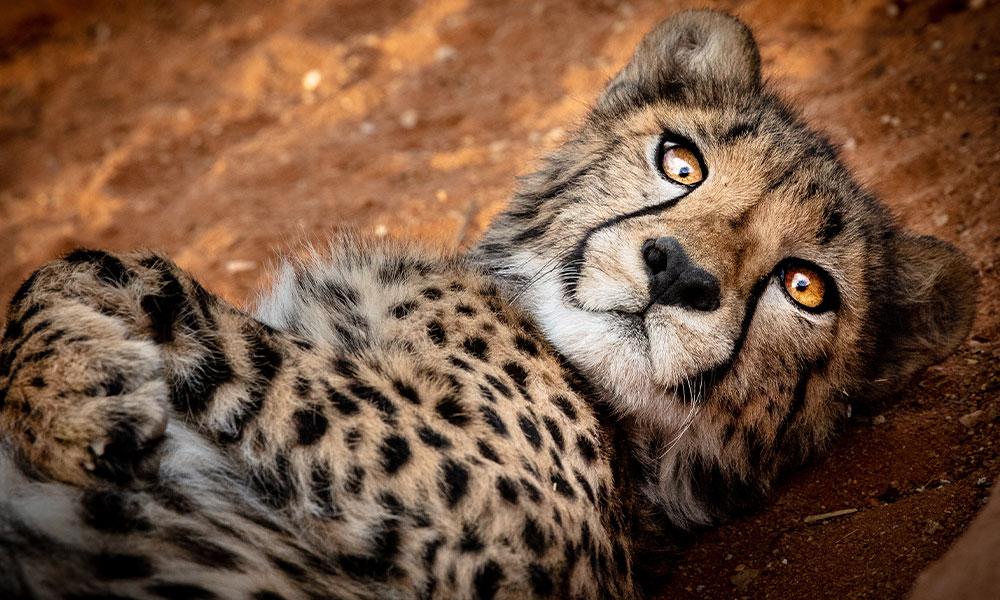
The Challenges Faced by Cheetahs
Habitat and Human Interaction:
Human-driven landscape transformations for agriculture and infrastructure often encroach on cheetah habitats. This leads to reduced spaces for cheetahs and their prey, demanding innovative solutions for sustainable development that considers the needs of both humans and wildlife.
Impact of Climate Change:
Climate change significantly threatens the delicate, arid ecosystems crucial for cheetah survival. Variations in weather patterns disrupt the availability of water and food resources for both cheetahs and their prey. Particularly in dryland ecosystems, where climate change exacerbates land degradation and alters rainfall patterns, cheetahs and other species face heightened risks. Effective climate action is imperative for their survival.
Human-Cheetah Coexistence:
Promoting coexistence in areas where cheetah habitats intersect with agricultural lands is crucial. Education and community engagement are key to mitigating conflicts and implementing non-lethal methods to protect livestock.
Threats of Poaching and Limited Genetic Diversity:
Climate change can be a driver of wildlife crime, as climate change impacts livelihoods, and communities may turn increasingly to activities such as poaching and trafficking as alternatives.
Poaching and the illegal wildlife trade pose severe threats to cheetah populations. The CCF and its partners advocate for stronger enforcement of wildlife laws and international cooperation. The limited genetic diversity among cheetahs makes them less adaptable to those environmental and anthropogenic threats, highlighting the importance of genetic research and conservation efforts in maintaining healthy populations.
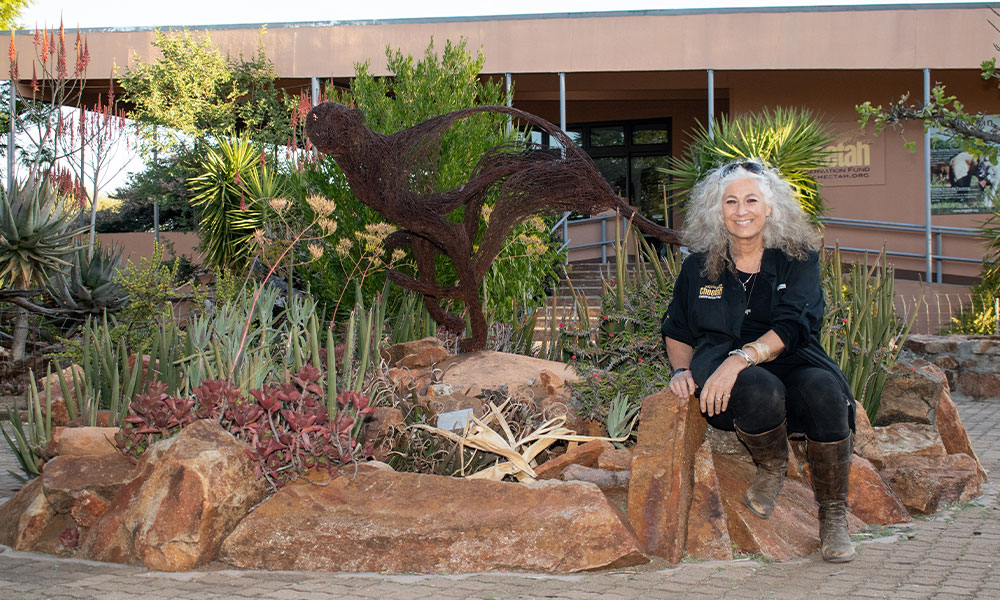
A Global Call to Action
Prof. Laurie Marker stresses the urgency: “On this International Cheetah Day, we issue a global call to action, urging not only awareness but active engagement in cheetah conservation. The challenges of climate change, especially in dryland ecosystems, highlight the need for integrated conservation strategies. Our collective efforts are crucial for cheetah survival.”
The Somaliland Minister for the Environment and Climate Change, Shukri H. Ishmil Bandara, states on International Cheetah Day that “Somaliland is at the forefront of cheetah protection efforts. As an arid nation, we are also extremely concerned with climate change and how it will impact our livelihoods and the future of our children. We see cheetahs and the landscapes they occupy as key for our future as protecting them means protecting nature and the solution it harbors for climate change.”
CCF’s believes that certification is critical to reversing the threats of climate change through consumers supporting livelihood development programs. CCF is certified by the Forest Stewardship Council (FSC®) for its biomass program, as well as its crafts and dairy products which are certified by Wildlife Friendly® Enterprise Network (WFEN). Christine Lippai, WFEN Executive Director explains, “Wildlife Friendly® Certification plays a pivotal role in advancing both wildlife conservation and community livelihoods by promoting sustainable practices that safeguard ecosystems, protect biodiversity, and provide economic opportunities for local communities.
Our work in partnership with herders and ranchers around the world helps to ensure wildlife corridors through working lands. These lands enable resilience for wildlife and people in the face of climate change. Wildlife Friendly® refers to a certification given to products and practices that adhere to conservation-friendly and ethical standards, ensuring that wildlife and their habitats are protected while promoting sustainable coexistence with local communities.” FSC® certification confirms that forests are being managed in a way that preserves biological diversity and benefits the lives of local people and workers, while ensuring it sustains economic viability.
Mr. David H. Barron, the Founder and Chairman of the International Conservation Caucus Foundation (ICCF) Group says in honor of International Cheetah Day “We speak of the importance of iconic species, those without which entire ecosystems would lose a certain character that could never be replaced. There is none more important nor more vulnerable than the magnificent cheetah. Prof. Laurie Marker and her CCF have been at the forefront of keeping cheetahs in the wild for over 30 years by educating farmers, providing canine protection, coordinating global captive breeding operations, and rehabilitating cheetahs and landscapes. The results are impressive and now they’re expanding into other cheetah range countries. But so much more needs to be done and if we don’t “get it right” now the next generation will see that we failed.”
Announcement – Global Cheetah Summit
In recognition of the plight of the cheetah and the actions needed to save them, CCF in partnership with the Ethiopian Wildlife Conservation Authority (EWCA), and sponsored by NEOM, will host the first Global Cheetah Summit to discuss the challenges facing the cheetah and action steps to reverse the decline of the species throughout t its range. The Global Cheetah Summit will be held from 28- 31 January 2024 in Addis Ababa, Ethiopia. For more information about the Summit please go to the website www.globalcheetahsummit.org or contact conference@cheetah.org.
# # #
International Cheetah Day
Prof. Laurie Marker, a renowned cheetah expert, designated December 4th as International Cheetah Day in honor of Khayam, a cheetah she raised at Wildlife Safari in Oregon. This day commemorates Prof. Marker’s pioneering research in Namibia in 1977, where she demonstrated that captive-born cheetahs could learn to hunt. Her experiences in Namibia, witnessing the conflict between farmers and cheetahs, inspired her to establish the CCF in 1990. Choosing Khayam’s birthday for International Cheetah Day, Prof. Marker aimed to highlight the global efforts in cheetah conservation. This day is now celebrated worldwide, emphasizing the importance of this magnificent species and the ongoing conservation efforts. For more information on International Cheetah Day events and resources, visit www.internationalcheetahday.com.
Cheetah Conservation Fund
Cheetah Conservation Fund (CCF), established in 1990, is a leading organization in cheetah research and conservation, committed to safeguarding their future in the wild. Known for their remarkable speed, cheetahs are a distinct species among big cats, with their population now below 7,500 globally. They face numerous challenges including human-wildlife conflict, genetic issues, habitat and prey loss, climate change, and illegal trade. CCF operates comprehensive conservation programs to mitigate these threats. With its headquarters in Namibia and a field base in Somaliland, CCF stands as the foremost authority in cheetah conservation. Visit www.cheetah.org for more on their efforts and how to contribute.
International Conservation Caucus Foundation (ICCF) Group
The International Conservation Caucus Foundation Group is a non-profit organization on the global political stage that is transforming conservation governance around the world by building political will and providing on-the-ground solutions. ICCF is empowering hundreds of international parliamentarians to strengthen a country’s legislative framework in a manner that is good for the planet, economies, and local communities. For more information about the ICCF Group, please visit www.internationalconservation.org.
The Margaret Pyke Trust
The Margaret Pyke Trust is the only member organization of the International Union for Conservation of Nature (IUCN) to also have over 50 years of expertise in sexual and reproductive health. Today, we partner with other environmental and health organizations, to improve sexual and reproductive health services, provide livelihoods and conserve biodiversity. We change biodiversity and climate policy to support reproductive choice. For more information about the Margaret Pyke Trust, please visit www.margaretpyke.org.
Wildlife Friendly® Enterprise Network (WFEN)
Wildlife Friendly Enterprise Network conserves threatened wildlife while contributing to the economic vitality of rural communities. WFEN includes conservationists, businesses, artisans, farmers, ranchers and herders, and harvesters and indigenous peoples from around the world. Our mission is to protect wildlife in wild places and on agricultural lands, by certifying enterprises that assure people and nature coexist and thrive. For more information about the Wildlife Friendly® Enterprise Network (WFEN) , please visit www.wildlifefriendly.org.
Davey Harris – Song Writer
Davey Harris is an expansively eclectic songwriter, storyteller, multi-instrumentalist and self-proclaimed “musical mad scientist” who has written over 1000 songs. Previously, he was the percussionist and co-founder for the band The Tins, which rose to prominence with their breakout hit, “The Green Room,” and cover of Bruce Springsteen’s “State Trooper.” Today, Davey leverages music to amplify causes, share stories of significance, and make an impact.
MEDIA CONTACTS:
US and Namibia:
Prof. Laurie Marker, director@cheetah.org +264 811247887
Dr. Bruce Brewer, bruce@cheetah.org +264 811247799
Shira Yashphe, shira@cheetah.org, +97254 5704959
UK: James Hanaway, jamesh@cheetah.org.uk, +44 7825 393306
UAE: Nyree Mc Farlane, nyree.mcfarlane@oliverwyman.com
ICCF Group: Susan Lylis, slylis@internationalconservation.org, +1 727 8081025.
Pictures available here: https://we.tl/t-qzWlHaXdQe
Climate change and cheetahs, extract from Cheetahs: Biology and Conservation a CCF Book attached or available here: https://we.tl/t-2wK2yODm0W
Related Reading
-
December 6, 2024
CCF Continues to Expand its Paw Print in the Horn of Africa

